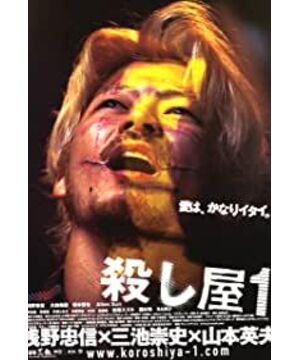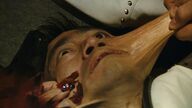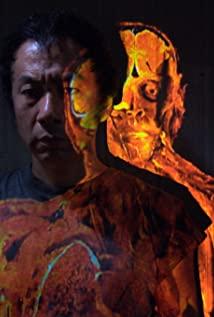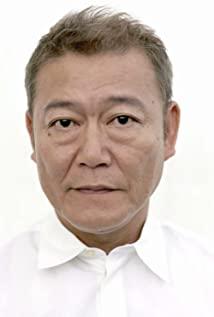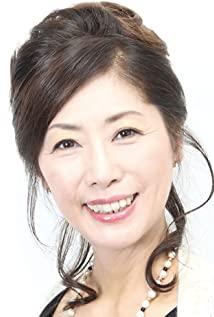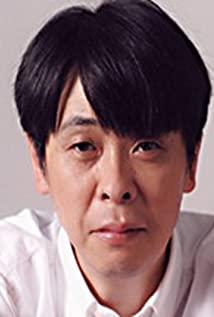man. Somewhat dull, always making mistakes at work, often reprimanded by the boss. One day, when he brought back the coffee from the guests, the boss threw a knife and told him to commit suicide. He was bullied by his classmates since he was a child, and he didn't even dare to fight back against the children. He is timid, cries, and often hides under the quilt and trembles.
another man. Murder is like numbness, and any bad person is scared to hear it. When he kills, he is more ruthless than a lunatic, and he never leaves a whole corpse behind. He always shows up in a black bodysuit with the word "1" on it, like Batman. After every kill, he disappears without a trace, and no one knows who he is.
Hajime is a hybrid of these two men, with a split personality between cowardice and ruthlessness. It's hard to imagine that both traits could exist in the same person, but there's a theory to explain it - balance. Just like Hajime, if the thrill of killing can make up for the humiliation of being bullied, then he will find his balance.
Seeking balance seems to be a human instinct. For Hajime, when he was bullied, he killed the person who bullied him; when he was bullied too much, he killed everyone who bullied him; when his lover was bullied, he killed the abuser; when a stranger was bullied, he killed the bully. , just kill all the bad guys...
this model works for everyone. When your boss reprimanded you, did you have the urge to rush up and slap him? At this time, your girlfriend called and said that you were bullied by hooligans while shopping, and you wanted to slap them with bruises immediately; after get off work, your wallet was stolen on the bus, and you began to curse the pickpockets; when you got home, you saw that the urban management The peddler commits violence, and he has the urge to "remove violence and make peace"... So you sigh, why is there so much injustice in this world? If I were a strong person, I would definitely teach these bastards a hard lesson.
It's a pity that you are not, and neither of us is, so we can only satisfy the psychological balance through obscenity. Hajime is a powerful man, and he turns lust into reality to achieve true balance. So when Hajime murdered, the scene of blood and flesh was enjoyable, if Miike Takashi had made it a little more beautiful.
In reality, professionalization seems to be an important reason for the lack of balance. Professionalism means you have to switch between roles, which is undoubtedly painful, and often accompanied by depression and humiliation. As a result, the "Men Sao Clan" who "rejected people thousands of miles away on the surface, but raped others 100 times in their hearts" was born. According to this standard, Hajime is a complete sullenness.
However, even though he killed a lot of bad guys, the sullen Hajime still couldn't find his balance, and he was always in pain. There are three reasons. First, he can't kill all the bad guys. Second, he cannot escape. Third, killing cannot solve the problem.
The root of the sense of humiliation lies in the long-term psychological trauma, and the use of murder as a means of "revenge on society" obviously cannot solve the problem. Therefore, after killing his "brother", Hajime, the killer, couldn't extricate himself in pain and cried like a child. Obviously, "strong people" cannot solve all problems. More important than strength is inner strength.
At the end of the film, the uncle who "abetted" Hajime to kill was hanged on a tree, but Hajime returned to the boy and left with a group of children. This seems to mean that the trauma of the past can only be healed by going back to the past.
But we cannot go back to the past. So, is this metaphor of Takashi Miike providing a solution or expressing his helplessness? I would like to have both.
Yuanyuan
"Ordinary people have two desires to abuse and be abused. It depends on which side you tend to prefer." For this issue, the person concerned has a more thorough understanding.
Kakihara's two desires are very strong. The abuse side is self-evident. Hanging people with hooks for torture, piercing the face, cutting nipples, these extremely perverted methods are commonplace for the underworld general Kagura. He also has an abused side. Opening a hole in his face and cutting his own tongue out, this kind of pain inflicted on his own flesh is even more horrifying, and Kakihara is equally unconcerned.
Compared with the tendency to abuse, Kakihara's desire to be abused is stronger. After the disappearance of Mr. An Sheng, he has been searching for it, and believes that An Sheng is still alive because of "falling in love with his pure violence and the pain in it". This is also the ultimate desire that governs Kakihara's actions.
It's a pity that the boss is dead, and this desire cannot be satisfied. While venting his sadistic desires in the process of looking for the boss, he accidentally discovered that the brutal Hajime was the one who could best satisfy his sadistic desires. The excitement before approaching Hajime truly reflects the nature of masochism: "I'm scared." "Does even the eldest brother get scared sometimes?" "No, I'm scared of myself. I'm full of expectations, full of expectations. and anxiety".
This kind of perverted man is the easiest to whet the audience's appetite. No, lift up the sadistic or masochistic desire that is buried deep within the audience, because Kakihara is the voice of this desire. And as the first paragraph of the article said, ordinary people have these two kinds of desires.
Of course, ordinary people won't cut their tongues, nor will they make two cuts on their faces, but does this prove that there is no tendency to be abused? When you know it's not good for your health, but you indulge in sex, drink, stay up late, and take drugs, when you enjoy the thrill of being thrown to the ground when you practice taekwondo, when you love the pain in tattoos, is it a big deal? kind of masochism?
Sadism is also common, but rarely manifested. Because once they vent, they will immediately become the target of thousands of people, and they will be scolded like cat abusers and dog abusers on the Internet.
If it is reduced to the nature of human beings as animals, it seems that it is not difficult to understand the simultaneous existence of these two desires. When animals compete for food, mates, and territory, there is always tussle and pain. Over time, when you get used to this way of living, the seeds of these two desires are planted, and a certain balance is formed.
For humans, civilization upsets this balance. "Sadistic" is naturally excluded from the category of civilization. Therefore, human beings who also survive in cruel environments can only choose "sadistic" to be discharged. The psychological explanation is that when you lose the channel to vent outward, you can only choose to vent inward. The tools for internal venting are usually alcohol, drugs, etc. There are also scalpels from the disabled. In my country's education system, this is a typical negative case.
As a "hardcore" abuser, Kakihara is not satisfied with mild abuse at all, so the pain of cutting his tongue and other flesh is not enough to stimulate. Kakihara needs a powerful abuser to achieve his ultimate "enjoyment" - torture to death.
Hajime is this person. He not only opened a "skylight" in Kagawa's forehead, but also forced him to fall to the ground from the patio of the building. Before he fell to his death, Yuan Yuan still exclaimed, "Wow! It feels so good."
But in fact, there were no scratches on Yuan Yuan's body's forehead, which means that Hajime did not abuse him. Yuan Yuan's death stemmed from his imagined struggle with Hajime. It can only be said that the masochistic desire has been suppressed for too long and can only be satisfied by imagination. But for a very masochist, it's a decent way to die.
At the end of the film, Yuan Yuan also gave Yuan Yuan a shot: in a dark house full of iron chains, Yuan Yuan sat alone against the wall and opened his huge mouth... The
house was very empty, and he was also very empty.
View more about Ichi the Killer reviews


